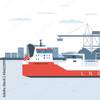"What's Your Arctic Fuel Choice?" Clean Arctic Alliance Asks Cosco
The Clean Arctic Alliance called on Cosco to make public the nature of the fuel that the Chinese cargo vessel Tian’en has used and carried through Arctic waters.
Clean Arctic Alliance Lead Advisor Sian Prior was responding to news that the Cosco-owned Tian’en has departed Arctic waters for the French port of Rouen, having travelled via the Arctic’s Northern Sea Route or “Polar Silk Road” along the coast of Russia, between the Pacific and the Atlantic.
"Cosco and its customers should commit using – and carrying only lighter distillate fuels or other cleaner alternatives instead of the world’s dirtiest fuel – heavy fuel oil (HFO) – to power ships in the Arctic,” Sian said.
“With Arctic summer sea ice at approximately half the extent it was in the 1970s and half the volume, and following the news that the region’s strongest sea ice has broken up twice this year, for the first time on record, using heavy fuel oil to power shipping in the Arctic is a poor choice. It not only increases the risk of oil spills, but also generates emissions of black carbon, which exacerbate the melting of both sea and glacier ice in the Arctic region.”
“Cosco should be leading a vanguard of companies interested in shipping commercial goods through the Arctic, as they move towards clean and renewable forms of propulsion for Arctic shipping”, continued Prior.
In April 2018, the International Maritime Organization’s Marine Environment Protection Committee agreed to move forward on consideration of a Arctic ban on heavy fuel oil – which is already banned in Antarctic waters. The meeting directed a sub-committee (PPR6) – which will meet in early 2019 – to develop a ban on heavy fuel oil use and carriage for use by ships in the Arctic, “on the basis of an assessment of the impacts” and “on an appropriate timescale”.
“There is nothing for shipping companies to celebrate about the melting of the Arctic ice. Using the Arctic as a passage is a privilege that brings responsibility”, said Chen Jiliang, researcher from Greenovation Hub, an environmental NGO based in Beijing.
“Now it is time for international shipping companies to clean up their act by moving to cleaner fuels, while operating in sensitive and vulnerable regions of the world – for the sake of the Arctic, its people, its wildlife and indeed, for the whole planet”, concluded Prior.













